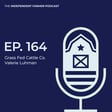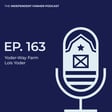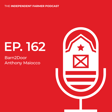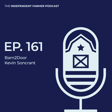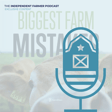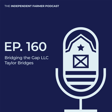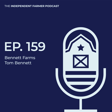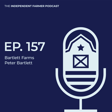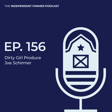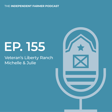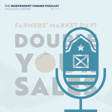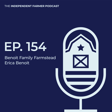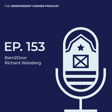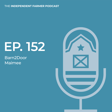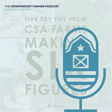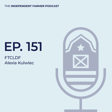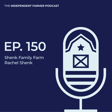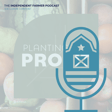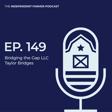Become a Creator today!Start creating today - Share your story with the world!
Start for free
00:00:00
00:00:01

Farm Commerce? 10 Questions to Find the Right Farm Business Solution
In this episode, we sit down with James and Zoe from Barn2Door to discuss the 10 most common questions Farmers ask when evaluating business solutions for their Farm.
Listen as James and Zoe discuss the nuances of Farm software and business solutions – and what Farmers should be aware of when considering general Commerce software.
You can also check out the accompanying blog: Farm Commerce? 10 Key Questions to Ask Before Deploying for Your Farm
Transcript
Introduction & Podcast Overview
00:00:03
Speaker
Welcome to the Direct Farm podcast, the go-to resource for farms across the US looking to grow and manage their business. Tune in weekly to hear tips and tactics from our most successful farmers on how to increase sales, access more customers, and save time and money. We'll also speak with industry experts, business leaders, and partners to share the latest farm business trends selling direct to market.
Meet the Hosts: James & Zoe
00:00:27
Speaker
Hey, welcome to the Direct Farm Podcast. I'm James, your host for today's episode. And I'm really excited because today we've got a great conversation for you. I'm sitting side by side with one of my colleagues, Zoe, who's been with us for almost three years now, right? Yeah, a little over three years. It's been crazy. Time flies. And she is now managing our sales team. And she's been with us for several years. She has a lot of experience. She's literally talked to thousands of farms all across the
Why is E-commerce Important for Farms?
00:00:54
Speaker
country.
00:00:54
Speaker
Today, we're going to be diving in with her to learn a little bit more about what types of questions you should be asking as a farmer before you deploy e-commerce for your farm. There's 10 key questions in particular that we're going to dive into. There's a blog that you can go download or read online at some point. But for today's podcast, we're going to be having a discussion because there's a lot of nuances that may not be necessarily covered in the blog. We're going to dive a little bit further.
00:01:22
Speaker
But before we get started Zoe I'd love to just you know Take a little bit of a background or with you and talk a little bit about your evolution here growing from sales to becoming a sales manager Yeah First off, you know, you've like I said, you've talked to thousands of farms literally thousands. Yeah
00:01:37
Speaker
the cool part about being here for so long too is I've been able to have the opportunity to talk to farms literally across the country from New York to California even to Florida right so I think there's some things that are different in every state but there are definitely some things that just run through and through from what we see our most successful farms doing across the board. Yeah and it's it's pretty cool to see the diversity of farms we work with. Clearly lots of proteins, produce and dairy but yeah
00:02:02
Speaker
everything from fiber farms to coffee farms, fisheries, like you name it. I love it. So many different creative options out there. And I think the cool thing is just the demand is so high for people wanting to buy local. It's like 94% of people would just prefer it. So as far as if you're thinking about farming, go for it. Yeah.
00:02:21
Speaker
It's a big market opportunity. Well, there's a lot of complexity out there, lots of different solutions that a farmer can evaluate. And this is not a pitch about Barnadore. This is much more about like kind of the 10 big questions that we see come up consistently. Because we're not going to pretend that Barnadore is a panacea. We don't solve all world problems, right?
00:02:39
Speaker
and there is no perfect solution out there. But we do come across some competitors regularly, but more importantly, there's a consistent set of questions that we see farmers asking before they deploy e
Balancing Online & In-person Sales
00:02:52
Speaker
-commerce. So I'd love to kick off this first question. First and foremost, does a solution support online and in-person sales? Zoe, why is that so important for farmers specifically to ask that question when thinking about other e-commerce options?
00:03:07
Speaker
Yeah, I mean, I think it's a great question. And I think, especially when you're selling product from a farm, and you're really looking to sell it locally, because that's what people are looking for, they want to feel like they know you, they want to feel like they can follow your story as well. So when you look at some of the different places that it's important to be able to sell from, whether it be the market, or you're doing on farm pickup or delivery locally,
00:03:28
Speaker
It's just that much more important to really be able to collect that customer information and turn that first-time potential purchaser, potential customer into an ongoing buyer because that's really the difference between a one-time purchase at the farm market, you might make 20 bucks there to transitioning them into an online buyer or somebody who's getting in front of your story on a frequent basis that makes them I think on average of an $88 per sale in that case.
00:03:56
Speaker
Huge lift your potential income and then really from there you can make that person a subscriber to your boxes Yeah, which is always the goal. Yeah, we hear this pretty consistently Don't we that like people who are the farmers market people don't attend farmers markets very frequently less than 1% of Americans Yeah, but more importantly, you know, they spread their money across the farmers market, right? They don't necessarily spend all their money But when they convert online, there's an opportunity to do more, correct?
00:04:21
Speaker
Absolutely. I think that's something that's important to know, right? Is if you're going to a market, it's great for getting your feet on the ground. But, you know, long-term, the most important thing you can do is capture that buyer with a QR code, capture that buyer with POS, for example. So being able to make sure you can swipe their card and then own that customer information because most people are really busy, right? So going to a market every week is a huge chore for a lot of people.
00:04:45
Speaker
Yeah. So that's a very big deal because the POS enables you to capture the in-person sale online, obviously with e-commerce, but most importantly, it's all in a single merchant account, one set of inventory.
Managing Multiple Price Lists
00:04:56
Speaker
Cool. Well, let's talk about the second one, which is we know a lot of farmers are asking about the ability to support multiple price lists, right? And this is a pretty unique nuance for farmers specifically. Why is this so important? Because this is something most e-commerce solutions don't address.
00:05:12
Speaker
Yeah. Yeah. It's a big one for farming, right? Because you do want to be able to sell just directly to folks in the local community. But a lot of our firms are also selling to restaurants, to chefs, to wholesale buyers. And I think looking at the healthiest way to grow your farm business, it's also about diversifying your customer base. So when you're thinking about an e-commerce for the operation, you really want to be able to make sure that you can capture on
00:05:37
Speaker
the chef buyers of the world, right? Because their average age is like 35 years old. They're generally really, really tech savvy and they also end up buying at really weird times. You know, they're cooking dinner late at night and their average buying hours are like 11 PM to 1 AM or something crazy like that. So we really need to make sure that you're offering those same capabilities for them to be able to set up things like standing orders on their own with separate pricing and separate product availability.
00:06:04
Speaker
Now, a lot of farms are concerned about their wholesale prices being available online. Talk a little bit more about that, because that's a big one, right? So first off is the ability to support multiple price lists, but also the ability to make sure that your wholesale prices aren't just available to retail buyers, correct?
00:06:24
Speaker
Yes, exactly. So the nice thing too, when you're looking for different options, is just being able to offer different price sheets, different price options for more bulk product as well, which oftentimes chefs want to choose, or even a lot of operations that we work with want to offer like a private buying club.
00:06:43
Speaker
So they want to be able to give a positive to those folks who maybe are loyal buyers and been purchasing from them for a long time or friends and family pricing as well. So you never want to be able to put that pricing public, otherwise then all of your other retail customers start to wonder why they're not getting that kind of a deal.
00:07:02
Speaker
Yeah, I think an important piece there is inviting being able to invite those people in, whether it be a chef or whether it be a loyal buyer, they need to have the option, you know, for you to choose if you want to have access or give them access or not.
00:07:15
Speaker
Yeah, I know we see a lot of people, particularly in states where herd shares are required legally for selling beef or any type of livestock or herd share for a, for instance, like a raw milk group, right? Yeah. Being able to have that set up privately is obviously a very big deal, right? Yeah. And I think, I mean, that allows farms to protect themselves as well. You know, there's certain products that you just can't publicly market to everybody and everyone. And so you really want to be able to pick and choose those folks who are loyal, who are going to be
00:07:45
Speaker
getting product from you on a regular basis and just invite those folks into that store. So this is a really key aspect available with Barnard door but that many other e-commerce solutions if you're looking at that type of diversity of priceless that's generally something not available with general e-commerce.
Exploring Fulfillment Options
00:08:01
Speaker
Let's talk about the other aspect of this, which is fulfillment, right? Being able to have multiple fulfillment. Because most people think today when they buy online, hey, I'm going to have something shipped to my door by UPS or FedEx, right? That's not necessarily the case with food, right? We want to share a little bit more about that, why designing or thinking about e-commerce and having more diversity is important.
00:08:22
Speaker
Yeah, yeah, shipping is expensive. And I think one of the things that we all have fallen guilty to is, for example, like ordering a hamburger and then spending more for the delivery of the hamburger than for the hamburger itself. And so when you think about selling your farm food locally, you want to be able to make sure that you can play on that convenience that people want, right? Everybody is really busy, buyers have gotten kind of lazy as well. And so
00:08:46
Speaker
It's so important as you're thinking about what e-commerce option you're going to utilize that it allows for you to do things like deliver to certain zip codes. You don't want to, for example, like be a California operation and only able to deliver across the country. You really want to be able to limit to one or two or three zip codes so that way you're not driving, you know,
00:09:07
Speaker
hundreds or thousands of miles, even though you're doing in-state delivery. So there's some real intricacies there, both for delivery, for offering pickup options. You really need to be able to offer unlimited pickup, right? Sometimes you want to do like pickup in a more populated downtown area.
00:09:24
Speaker
Sometimes you want to do pick up you know at a coffee shop or something like that right so you can drive them customers and they can drive it for you, but if you ever get into a situation where you feel like you can't offer another form of fulfillment then you're just limiting potential customers that could be finding you and buying from you.
00:09:41
Speaker
Yeah, and you covered a lot of nuances, which are super important for food specifically. Because again, generally, horizontal e-commerce is shipping-focused. It's very much focused on consumer product goods, like a water bottle or a pair of swim trunks, right? Whereas we see 98% of the products that are bought from Barnador Farms that we work with are delivered or set up for pickup, right? Because you don't ship food across the country, generally, unless it's a very geographically unique product.
Benefits of Product Subscriptions
00:10:09
Speaker
So let's move on because this gets into one of the other really great parts of food, which is people keep eating, right? And they're always going to keep eating. And so if you build a relationship with your buyers, which we know many farmers are proud to do, one of the big questions to ask is, does a solution support subscriptions? Why is this so important for farmers?
00:10:33
Speaker
Subscriptions are massive I think for farming specifically because once a customer knows they like your farm product it's really easy for them to purchase from you ongoing if you offer subscriptions and if you don't like I said before people are pretty lazy so we need to be able to offer them what they're used to getting from other places like
00:10:54
Speaker
the Netflix's of the world or the Spotify's of the world where folks can auto pay because we are such creatures of habit. I think if you look at options that don't offer subscriptions for you, you really put yourself in a position where you might get a one-time buyer, but then you're doing so much legwork trying to find your next customer.
00:11:15
Speaker
So subscriptions really allow you to own your customer base and give your customers just another level of convenience. And convenience at the end of the day is always going to be the tipping point from your farm winning that customer. And I certainly know for myself, 90% of what I purchase every week, and I know it seems true even for restaurants, it's the same thing. It's proteins, produce, and dairy, right? I want to have a dairy subscription. I want to have a protein subscription. I want to have a produce subscription. And I want it to either just show up at a pickup
00:11:45
Speaker
or I want it delivered to my door, right? Because to your point, we're all creatures of habit and we've become increasingly lazy, right? Can you talk a little bit about some of the trends there? Because I know like pre-COVID purchasing food online was a novelty. Yeah. You want to talk about what you've seen now, like, because you've been there before and after, right? Yeah, I mean, the average American owns nine subscriptions, which I want to say well, but then the other piece of me is like, I think I bring that number up. I have like 15. So
00:12:12
Speaker
People have just really gotten into the habit of wanting one, just an easy, easy food delivered to their door on an ongoing basis. I believe that number is like three in five Americans have food delivered directly to them on a weekly or monthly basis.
00:12:27
Speaker
That's something customers are definitely looking for. And then on the flip side too, when you look at demand for a lot of food products, whether it be proteins or eggs, right? We're oftentimes as consumers going to the grocery stores and the things that we want are sold out. And so all of a sudden now we're kind of scrambling to figure out how we're going to feed our families. So more and more of these busy families want to be able to subscribe to their product and they want to know that they're actually going to get it and that the cost isn't going to jump up on them astronomically.
00:12:56
Speaker
So you mentioned two things. One is food security and the other one is inflationary concerns. So if I'm on a budget as a family or as a chef running a restaurant,
00:13:06
Speaker
I just want to subscribe for and know that I'm going to get a given product, whether it's ongoing indefinitely or for a given season. The other thing too is I know that subscriptions, as you mentioned earlier, is generally not native to many other e-commerce platforms. People really need to do their research on this. I won't go into all the details, but look at the cost of subscriptions. With Barnadore, there's no additional cost to use subscriptions.
00:13:30
Speaker
But with the other solutions that are out there, you have to use like a recharge, charge a phi, charge B, et cetera. What do those costs look like, Zoe? Yeah. So we see a lot of different costs for competitors. I think the number one thing to look out for is just cost per subscription. I see that a lot. So that's going to be a couple of dollars for every subscription that you sell or even a percentage of that overall percentage.
00:13:54
Speaker
Most of them are about like 1% plus 10 cents. That's something too, as you look at scaling your operation, that can be a huge chunk of money every single month that you're spending just to pay for offering subscriptions alone. Well, absolutely. I know we have farms that do well above a million dollars a year in subscriptions. If they had to pay 1%, that'd be 10 grand just to have a subscription. Now, obviously with us, there's no cost for that.
00:14:21
Speaker
something they can get ongoing. So whether your farm has an ambition to do 100 grand or a million dollars in subscriptions, that's a real amount of money that you'd have to pay out for a third party solution versus it being native with barn to door. The one last trend I just want to share with folks too is that we've seen the number of people opting into subscriptions has increased 250% over the last year.
00:14:44
Speaker
And so now, 40% of all volume going through Barnard Door is subscriptions. Like you said, it is a hot topic, not only for buyers, but for farmers, that means recurring revenue, which is awesome. Well, let's shift to this next one, because this is very farm-specific, too. And I know this is kind of one of the areas where we got our start at Barnard Door.
Selling by Weight: Maximize Earnings
00:15:04
Speaker
But we still see this as a really big differentiator, which is, does the solution support sell by weight and or fixed prices? Why is this such a big deal for food, Joey? You don't want to lose money, right? This is such a big topic when I chat with farmers too. People are so surprised that that's something that we can do. It's a really amazing thing to be able to offer because every time that you offer a flat cost for a product that should be charged at a variable weight, you're losing dollars.
00:15:33
Speaker
Yeah, so that should be money signs in your eyes and it's something that's again. It's really unique and it's going to matter whether you're offering like, you know quarters halves and holes when we're talking beef or your Thanksgiving birds, right? Yeah, really want to be able to make sure that you're actually getting
00:15:48
Speaker
you know, your $85 that you should be for the bird instead of charging a flat rate at $60, for example. So those are things to think about. And it goes across the board from like a really high end cut of meat, all the way up, like I said, to birds that you might be offering for different times of the year.
00:16:03
Speaker
Yeah. And I know we've got a patent around this capability, which is pretty cool where, you know, someone can place a deposit for that bird or for that side of beef, but then they can reconcile the final payment and the payments tokenized, which is pretty cool. So they don't have to ask the person to pay again. It's like they can just charge the customer specifically, right?
00:16:23
Speaker
I think that's a huge point and something so many farmers come to me and they're so thankful for because I know you guys are out there farming, you're super, super busy and it's an uncomfortable conversation to have with a customer when you know that you've provided them this high-end product and you've provided them probably a high-end service and stayed in communication with them there as well.
00:16:45
Speaker
And then all of a sudden you feel like you need to chase them down and ask them for you know if it's a couple thousand dollars for a whole animal. That's an awkward conversation and it takes time out of your day too. And I think just looking at what we know from the stats is it's like an average of seven to nine touches back and forth in conversation whether someone's buying over
00:17:05
Speaker
social media or if you're just chatting back and forth in person to make an order, and we don't want to extend that anymore. I mean, that's a big reason why people deploy e-commerce in the first place, is to limit that to one or two touches and make it easy for the buyer. Yeah. I don't think I've ever talked to anybody at Cabela's or Amazon or Target. When I purchase online, I just make a purchase. But with food, the ability to be able to place a deposit, and then when that product is eventually harvested,
00:17:31
Speaker
the farmer can literally like I said they don't have to chase down the payment they can just put in whatever the final weight or whatever the final price is and it'll just charge them on the spot. So this is a big one if you have products as a farmer and you're looking to sell by weight and as Zoe said maximize your earnings you need to make sure you're looking at e-commerce solutions that will support the ability to sell by weight.
Integrating E-commerce with Business Apps
00:17:53
Speaker
Let's shift over to number six. Many of the farms we work with have a variety of other business tools and solutions that they're using, whether it be for email or for managing their finances or taxes. Talk to me a little bit about this. Does a solution integrate with existing business applications? Why is this so important for farmers?
00:18:11
Speaker
Yeah. I mean, think about scalability, right? As you continue to access more customers and continue to grow the farm operation, there are a lot of different tools that you're going to really want to utilize that you don't want to utilize outside of the e-commerce. So I'll even mention delivery because we've talked a lot about that to start, but we've got a really great integration with.
00:18:30
Speaker
that allows folks to take orders and then be able to actually see their route that they're going out and driving based off of right turn. So you don't have to wait at stoplights. And that's one of those things that if you're not using an integration or it's not built into your e-commerce, then all of a sudden, I'm sure many of you have been through this, you're sitting there writing out or trying to manually map out the plan that you're going to drive for that day, which is very time consuming.
00:18:55
Speaker
and takes up a lot of money on gas. So I think another one to look at too is just any email communication tool. So we're integrated with MailChimp. You never want to be doing tasks outside of where all of your customers are because it's a lot of manual effort. You're probably missing out on different customers that you could be communicating with or that could be buying from you.
00:19:16
Speaker
And then it's more steps for them to make a purchase. So when we talk about email communication there, you want to be able to link the store, link products in so customers can actually add add-ons. Otherwise, you're using a whole separate tool and you're just sending out nice newsletters. But customers can't take an action and they're not going to make a purchase from there.
00:19:35
Speaker
So the real key here is being able to have these business tools, like you said, routing, email communications, and even obviously your general ledger, like QuickBooks, having it all integrated, so to your point, they can save time, right? Like it's just all bits and bytes, right? So to have all that data just to flow seamlessly from one place to the next is going to save a ton of time.
00:19:56
Speaker
Number two, it's also going to remove errors because this is the other beautiful part about it. If you're trying to go through and you have hundreds of e-mails in MailChimp and you have hundreds of orders in Barnadore, who wants to first off manually enter those two bits of data? You'd much rather just press a button and have it work seamlessly. I know particularly routing is a big one. Having the routing capabilities directly linked with
00:20:21
Speaker
not only your pick-pack list, but more importantly, your delivery schedule itself, right? So your drivers know where to go and you're saving a ton of time. Huge, huge time savings. Please, as you think about your business, if you are a farmer that is very keen on delivery, I know we work with a lot of dairies in particular who have heavy delivery routes, a lot of CSA subscription produce boxes, anybody who's doing delivery, this is a huge time savers and also a big fuel savings.
00:20:49
Speaker
Yeah as well. We need to talk a little bit about that. I can't remember the stats right off the top of my head about fuel savings when you use a delivery app. It's like 35 percent that you save in terms of money there and everybody knows that we're spending a lot on fuel right now. So that's a that's a lot of money to be added. I think time there as well. So something that will even allow you the option to just only do right turns instead of sitting at red lights. That sounds so small. Something that that
00:21:15
Speaker
FedEx also uses right because they're doing lots of deliveries But it actually ends up getting you so much time back and also really allowing you to not spend as much on gas So those are things that again as you look at scaling or you know Wanting to make sure that you can make more money from the operation with something like delivery You really need to be able to have set up for a long term even if it's gonna happen in a year or five years from now you just want to be able to hit the ground running instead of feeling like you need to choose
00:21:44
Speaker
a option right off the get-go and then end up making a change later on. One thing I also want to add in here too, and we have some other resources on this, is that many of our farms make delivery quite profitable because people are willing to pay for delivery. But secondly, it's also ecologically an advantage. It's actually a lower carbon footprint when a farmer does deliveries. It's much easier to just have one truck run out to do
00:22:06
Speaker
100 deliveries and pickups versus having 100 customers driving to your farm or driving to a pickup location. That's a good point. I know that many of our farms are very concerned ecologically too and just wanting to actually do the right thing for the environment but also be able to do it profitably.
00:22:21
Speaker
Let's move on to the next question because this is a big topic that I know many of our farms today who primarily sell with cash and check if they've not sold online before have apprehensions about accepting credit card,
Handling Credit Card Fees & Tipping
00:22:34
Speaker
right? We charge 2.9% plus 30 cents. That's pretty standard in the industry today. It's generally set by big banks, et cetera. But what has been your experience with this? Like how can farmers potentially cut their processing rates down
00:22:49
Speaker
Or how should they be comparing their processing rates across different e-commerce solutions? Yeah, that's a good question. And I think one thing to remember too is like 93% of people prefer to pay with card. They want to pay with debit or credit. It is so much easier. People have their cards saved to their phones, all of that. So when it comes to convenience, just offering card alone is going to, first of all, win you quite a few more customers and make sure that customers keep coming back and buying from you ongoing.
00:23:16
Speaker
Some of the things to think about though would be just looking at ways to help manage processing fees because it's a real fee, it's a cost of doing business. So what you should look at is, does the solution have a custom tipping feature and does the solution have the ability for customers to cover the processing fees for you? So those are two things a lot of our firms see a ton of success with because as customers are buying locally, again, they feel connected to your operation, they're buying from you really intentionally,
00:23:46
Speaker
people want to be able to tip you and help cover those processing fees. So look for ways in which the system can help you mitigate those fees without you needing to go out and ask the customer to do it. Right. I know about a quarter of the farms we work with today who offer tipping
00:24:03
Speaker
Um, pay nothing in processing because people opt in and graciously give a tip. And particularly if you have somebody that has a, you know, let's say your average order is $25, right? People give you a $5 tip. Well, that's, that's 20%. I have more than covers the processing fees. Yeah, exactly.
00:24:20
Speaker
Yeah, so it's pretty cool to see farmers have success with tipping. And I think on the flip side of it, like you said, because the vast majority of Americans prefer to buy with a credit card now, you know, if you price your products with the expectation that people are going to be paying by credit, there should be no margin in impact anyhow.
00:24:38
Speaker
So that's a good point. Well, let's move on to talking a little bit about some of the things that we see across other solutions.
Marketplace Selling vs. Direct E-commerce
00:24:47
Speaker
You know, many farmers today work with like marketplaces or regional food hubs, et cetera, who either mark up or take a percentage of sales. How should farmers be thinking about this when they're looking at available solutions online? What have you seen in terms of range of percentages and then talk about what Barnador does there?
00:25:06
Speaker
Yeah, so, I mean, we do see, right, a lot of families who come to us who maybe already use a marketplace or some kind of food hub, and on average, right, a marketplace is gonna be about 40% that they're taking out of your pocket. Amazon, right, I sometimes get farmers that ask me about Amazon, it's about 40%, so it's a big number, but I think, more importantly, that marketplace or that hub, just like a market, right, they own your customer base. Yes.
00:25:32
Speaker
Really, when we're kind of chatting about what the future of your firm looks like, you want to think about, do you want to own your brand? Do you want to have customers be able to come back to you and find you and remember you and continue to buy from you? And so those are things to think about, right, as you look at the differences between, say,
00:25:50
Speaker
like a marketplace and then really being able to have e-commerce specifically. And that's that's our goal at Barnetador is to give you ownership over your customers because you want people subscribing to products. You want people coming back and buying from you on an ongoing basis rather than like I was saying before putting in the legwork every single time you want to make a sale.
00:26:10
Speaker
Yeah, and I know one of the big things that when I look at marketplaces is that, you know, a farmer's brand, their product becomes a commodity. Oh, yeah. And, you know, then there's a lot of price comparison. And then that becomes a race to the bottom versus a farmer who really owns their brand and people are paying a premium for the product and paying for the relationship with the farmer. Right. Yeah. You know, unlike with e-commerce, when they're selling direct, they get to control their own pricing. Yeah.
00:26:39
Speaker
Yeah, that's a really good point. I think anytime you look at a marketplace, right? It's the customers looking up a certain product and then they are just price competing. So they're deciding exactly what to buy based off of what is the least expensive. When you look at owning your brand and owning that customer base, you get to charge premium pricing because people truly respect and trust and want to buy directly from you. So it gives you such a big lift on potential earnings from the operation as well.
00:27:04
Speaker
Yeah. Now there's a couple of other solutions out there that are not marketplaces that are kind of like niche solutions just for like proto-CSAs, right? Yeah. What do you see the range of percentages those folks are charging on average as well? Oh gosh. Yeah. I think, I mean, I get farmers that come to me all the time that are like, I'm paying 30, $40,000 a year for, you know, just for added percentages that are coming out on a monthly basis. But I've seen between, I would say like five and 10%. I would say 7% is kind of the,
00:27:34
Speaker
the number one percentage I've seen taken out of sales, which is a lot, right? So when you look at earnings, when you look at scalability and where you want to go, that really cuts into your ability as a farm to continue to grow the operation. And oftentimes makes you kind of worry about maybe I don't want to sell as much. Maybe I don't want to expand because I'm getting this big chunk taken out of my potential earnings.
00:27:54
Speaker
Yes, 7% is a pretty significant number. I've seen as low as 2%, but essentially, anywhere between 2% and 7%, that's still a pretty significant margin, because if you're selling a product and your net margin's 20% and somebody's taking an additional 2%, they're taking 10% of your profit. If they're taking 7%, you're talking like 35% of your profit is being paid to a solution that's just offering software. Now, in the case of Barnadore, what about us? Are we taking any percentage from a farmer?
00:28:23
Speaker
No, no percentage of sales and farmers are always so surprised when we hit that part of the conversation. But I mean, I think that that goes back to showing like we're really looking to help our farmers grow. We want to help you scale, help you reach more customers. And I just in terms of fairness for how much respect and pride you put into your product. You know, we don't want to take a percentage of sales. We just charge that base subscription. You know, you can do it monthly or annually. But
00:28:51
Speaker
really wanting to help you grow. And that's a big piece of why we offer all the support that we have in place. And that's the beauty of being the size we are. I know some of these other niche solutions are quite small, but in our case, we serve thousands of farmers. So we don't have to make a profit off the back of any one farm, right? So it gives us a little bit more flexibility with our pricing.
00:29:08
Speaker
Let's talk about support because I know this is a really big one.
Support & Account Management
00:29:11
Speaker
Many folks who work with big name e-commerce solutions, they really struggle with support because farmers are farmers, they're smart people, but they just don't have the time necessarily to try to spend, trying to resolve technical issues, resolve an integration. If there's confusion about something or need some assistance, can you talk a little bit about the importance of support when evaluating a solution for your farm?
00:29:36
Speaker
Yeah. Yeah. And I think, again, this is a really big one because I see a lot of farmers that will come to me too. And the first topic of conversation is, you know, is it something that I'm going to be able to actually talk to real people with, you know? And that's a really big thing to think about. So I know some of the just name brand e-commerce is that are more general out there might have support that is not local to the US or
00:30:00
Speaker
that might only be able to respond within a three-day to a week-long period. So you really want to be able to have someone that you can talk to same day, that you can ask questions to or chat to directly. That's a big piece to the puzzle as well is that as you guys scale, it is one of those things that you want to be able to connect with someone off the bat and not wait multiple days in order to figure out what the solution is.
00:30:26
Speaker
Yeah. I know this is a very big distinction for us at Barnadore is that much like very large enterprise companies who have like entire teams dedicated to what they call success at Barnadore, I think we're the only solution in the entire market that has an entire success team, fully dedicated seven days a week. There is support available to farmers who need assistance. Right. And I love the fact that, you know, many of our farms know the name of their account manager.
00:30:53
Speaker
have a personal relationship with them, right? And they don't have to start over every time because they know their business, right? And can you talk a little bit about the importance of our laser focus on working with farms and why that matters in terms like best practices or coaching our guidance with that account manager?
00:31:10
Speaker
Yeah. And I think, I mean, when you think of support, it can be twofold as well. Our team has an onboarding manager as you get started for actually building out the e-commerce and learning the logistics and understanding those best practices and then having an account manager for long-term support and the ability to set up some go-to-market strategy and understanding what other farmers are doing to be successful as well.
00:31:32
Speaker
Something to think about as well when you're getting started with any e-commerce is like, will I have support actually setting this up? Because that's such a big piece. If you don't get it set up, then you never end up really get rolling. From there, I would say you really want to be able to understand or have a team or an individual person that's there to back you up.
00:31:52
Speaker
When you're looking at what customer buying trends are, that's a big piece, subscriptions, box sizes. There's some intricacies there that if you don't know, you can miss the pedal on that and then customers don't end up purchasing, for example, if those boxes are too big.
00:32:08
Speaker
So having a farm specific individual that knows the market and that knows what it looks like to be successful can do a couple things for you. One of which is just help save you time so you don't make those mistakes that they've seen happen in the past. But then also just help set you up to be successful long term because that's the goal is figuring out where you're at right now as an operation and looking, you know, five years, 10 years in the future and being able to see what you can do to actually grow and expand.
00:32:36
Speaker
Yeah, tons of content, tons of resources. So look, when exploring the options for your farm, make sure you're looking at like what's available specific to farming, farming best practices. One last thing I'll ask on the success side, I know this is something we debuted about a year ago, is also a community of other farmers for people to connect with.
00:32:59
Speaker
Can you share a little bit more about the Connect program? Because I think this is something I encourage you when you look at other solutions, ask yourself, is there a program where you can connect with other farmers that are going to help you be successful? Can you share a little bit more about the Connect program and what that means?
00:33:13
Speaker
Yeah, and I think diving into how it can help a farm specifically is you want to be able, like I said, to have an onboarding manager and an account manager, so people that are there to help you long term, but you also want to have a community of farms who have been through it and who can give you tactics and advice for
00:33:31
Speaker
Say you're wanting to get into delivery or you need to talk a little bit more about pricing and packaging. The Connect program is really great because all of these farmers might have started out at one point or thinking this might be a hobby operation and now so many of them are in that six figure, even seven figure size. So being able to chat with somebody who's done it themselves and who has seen success, whether it be attending markets or doing just delivery is such an amazing and really invaluable resource as
00:34:01
Speaker
you may be looking at growth or, again, just overcoming or missing out on making any premature mistakes because many of them maybe have made those mistakes and are now looking at growing forward and moving forward and kind of showing you those best practices as well. Super. Really great feedback.
00:34:17
Speaker
Well, let's end here with our last question, which is, you touched on this a little bit earlier, many e-commerce solutions that are out there, or marketplaces that are out there, take ownership of the customer relationship.
Owning Customer Relationships
00:34:29
Speaker
Can you come back to this one and talk a little bit more about why owning the customer relationship is so important in terms of a long-term business strategy, and more importantly, around resiliency for a farmer's business?
00:34:42
Speaker
Yeah. So if a farmer or if your customer excuse me knows you and is following along with your journey and is buying from you intentionally they will be your customer for life. Right. So they are going to do things like subscribe. Their cart size is going to continue to go up. They're really married to buying from you. So then as you communicate with them via email as you
00:35:05
Speaker
Post on social, making it really easy and convenient for those folks who already know you to continue to make purchases from you helps you scale. So when you look at owning a customer and even offering subscriptions, our farms on average are making up to about 80% of their revenue month to month from offering subscriptions to a loyal customer base. So there's a couple pieces there, one of which is just having regular sales, but the other of which is having a premium brand out there allows you to charge premium pricing.
00:35:35
Speaker
And so many of our farms actually have the capability to continue to increase prices for products every six months or every year because customers respect them and trust them so much that they want to and are willing to pay more for the product as well. What I also love is that these types of loyal buyers oftentimes are eager to amplify the relationship with their farmer. Can you talk a little bit more about that? Because that's effectively a form of free marketing for farmers to expand their reach.
00:36:03
Speaker
Right. Yeah. And I think that's a great point. The best way to continue to grow sales is organically, I would say for food specifically. So a lot of customers want to be able to share out your information and without having a premium brand in place, they can't do that. So I know just putting the branding in place, building out a site, having the capability for people to shop from you in all of these places, it increases sales on average by about three times. It also
00:36:29
Speaker
brings customers back. So it keeps your attention rate up. So three times as many referrals as well, which is really what builds community and gets people, again, excited about coming back to you and excited about the fact that you're growing and raising locally. Well, well said, Joey.
00:36:44
Speaker
Well, I want to thank everyone for joining us today and listening in. And a special thanks to Zoe for putting years of her time and professional development here at Barnadore working with many farmers like you across the country. Perhaps some of you have even talked to Zoe in the past and certainly probably talked to some of her colleagues.
00:37:00
Speaker
But I want you to know that at Barnadore we're really humbled to serve thousands of farms all across the country in all 50 states. And we're really dedicated exclusively to farms to implement sustainable agricultural practices and more importantly support their local communities.
00:37:16
Speaker
If you would like to connect with farmers and learn more, including the opportunity to speak with some of the farm advisors that are a part of our Connect program and hear their stories about how they've been able to grow their business to six and seven figures, we'd invite you to become a part of the Barnadore family, right? And we encourage you to come to Barnadore. You can go to our website and click to watch a demo or hit contact for reaching out to and speaking with someone like Zoe or someone on our team.
00:37:42
Speaker
We'd be happy to hear your dreams for your farm and how we might be able to support you Thank you so much for your time and we look forward for you to join us next time on the direct farm podcast We wish you the best and have a wonderful day. Take care
00:37:59
Speaker
Thanks for tuning in. For more free farm resources, tips, and tactics that are most successful farms use to grow and manage their business, visit barnadore.com slash resources. Also don't forget to subscribe to the direct farm podcast to automatically download our weekly episodes. Thanks for listening and we'll see you next week.
